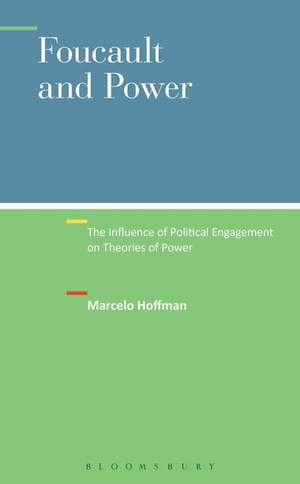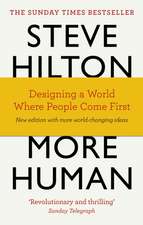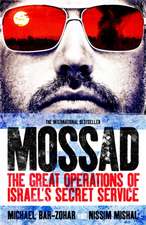Foucault and Power: The Influence of Political Engagement on Theories of Power
Autor Dr. Marcelo Hoffmanen Limba Engleză Paperback – 15 iul 2015
| Toate formatele și edițiile | Preț | Express |
|---|---|---|
| Paperback (1) | 256.59 lei 6-8 săpt. | |
| Bloomsbury Publishing – 15 iul 2015 | 256.59 lei 6-8 săpt. | |
| Hardback (1) | 772.58 lei 6-8 săpt. | |
| Bloomsbury Publishing – 15 ian 2014 | 772.58 lei 6-8 săpt. |
Preț: 256.59 lei
Preț vechi: 330.70 lei
-22% Nou
Puncte Express: 385
Preț estimativ în valută:
49.10€ • 50.95$ • 41.04£
49.10€ • 50.95$ • 41.04£
Carte tipărită la comandă
Livrare economică 17-31 martie
Preluare comenzi: 021 569.72.76
Specificații
ISBN-13: 9781501308284
ISBN-10: 1501308289
Pagini: 232
Dimensiuni: 152 x 229 x 25 mm
Greutate: 0.32 kg
Editura: Bloomsbury Publishing
Colecția Bloomsbury Academic
Locul publicării:New York, United States
ISBN-10: 1501308289
Pagini: 232
Dimensiuni: 152 x 229 x 25 mm
Greutate: 0.32 kg
Editura: Bloomsbury Publishing
Colecția Bloomsbury Academic
Locul publicării:New York, United States
Caracteristici
Shows how Foucault's theory of power developed in relations to his political activities
Notă biografică
Marcelo Hoffman received his Ph.D. from the University of Denver, and has taught at Earlham College and Marian University. His writings on Foucault have been published in New Political Science, Telos, Philosophy & Social Criticism and Michel Foucault: Key Concepts.
Cuprins
Acknowledgements1. Foucault: Militant Analyst of Power 2. Foucault, the Prisoner Support Movement and Disciplinary Power3. Beyond the Bellicose Model of Power?4. People Versus Population: Foucault on the Iranian Revolution 5. Foucault, Poland and Parrhesia6. ConclusionAppendix: Investigation in 20 Prisons by the Information Group on PrisonsBibliographyIndex
Recenzii
Marcelo Hoffman's book proposes to examine the relationship of Foucault's own extra-theoretical political practices to his political theory. In doing so, Hoffman emphasizes radical commitments often disregarded in recent scholarship that reduces Foucault's thought to liberal banality. By seeing his radical practices juxtaposed with his radical thought, we get a convincing portrait of a radical Foucault. Hoffman's account of each of these two dimensions is excellent.
Marcelo Hoffman's clear and cogent interpretation of Foucault's work in light of his political activism, from the start of the 1970s until his death, strikes the right chord to alert us that for Foucault it was always personal and it was always political, always subject and power. Combining some of the best aspects of intellectual biography with the interpretive acuity to be gained from archival research in Paris, Hoffman portrays Foucault as a consistently activist thinker.
The Foucault that emerges as a result of Hoffman's handling is one whose writing is motivated by deep concern for others, the result of careful self-reflection, and in service of social justice broadly. Hoffman's Foucault is a militant, yet compassionate. In this way, Hoffman presents a generous and sympathetic portrait of a much maligned iconoclast.
Hoffman manages to achieve that rarest of feats: a return to Foucault's texts that puts us back in touch with some of the pressing political motivations behind the theorisations many of us know so well (and that in other hands have become somewhat tired, mantric, platitudinous).
For the first time, an author extensively analyses Michel Foucault's political activities and not only his involvement in the Iranian Revolution. Hoffman also connects these political activities to Foucault's theory of power and does not refer to them only as biographical information...A great advantage of the book is its absolutely clear structure which, combined with the intelligible writing of the author, makes it very comprehensible to anyone interested in Foucault, from students and researchers to non-academic, but systematic readers of his work...Marcelo Hoffman's theoretical venture gives us very useful insights. Through the highlighting of the dialectical relationship between theory and practice in Foucault's work, the author primarily provides us with a new tool with which to approach the work of Foucault.
Hoffman clearly challenges readings of Foucault that demarcate his thinking according to the break with one theory of power in lieu of another. Hoffman conducts a nuanced and precise study of how subsequent iterations of power bear the residuals of predecessor accounts or are informed by them in significant ways.
A powerful reinterpretation of Foucault's work and his political activism. It contains the best account in English of his work with the Group for Information on Prisons, and pairs an analysis of his well-known writings on Iran with his neglected writings and actions in relation to Poland at the time of Solidarity and martial law. The integration of these engagements with his published works and lecture courses sheds new light on many of his concerns.
This is the kind of reading and appraisal of Foucault's thinking on power I have long waited for. It strikes a stark contrast with the overwhelmingly depoliticized engagements which have dominated the Anglo-American reception of his thought. For here, finally, and substantially, we read an author taking Foucault's militancy seriously, and contextualizing it brilliantly, within the larger problems of his analyses and theories of biopower and population, to produce an account of how Foucault helps us to think beyond the biopolitical subject of liberal modernity. Hoffman has done Foucault a great service in writing this book.
Marcelo Hoffman's clear and cogent interpretation of Foucault's work in light of his political activism, from the start of the 1970s until his death, strikes the right chord to alert us that for Foucault it was always personal and it was always political, always subject and power. Combining some of the best aspects of intellectual biography with the interpretive acuity to be gained from archival research in Paris, Hoffman portrays Foucault as a consistently activist thinker.
The Foucault that emerges as a result of Hoffman's handling is one whose writing is motivated by deep concern for others, the result of careful self-reflection, and in service of social justice broadly. Hoffman's Foucault is a militant, yet compassionate. In this way, Hoffman presents a generous and sympathetic portrait of a much maligned iconoclast.
Hoffman manages to achieve that rarest of feats: a return to Foucault's texts that puts us back in touch with some of the pressing political motivations behind the theorisations many of us know so well (and that in other hands have become somewhat tired, mantric, platitudinous).
For the first time, an author extensively analyses Michel Foucault's political activities and not only his involvement in the Iranian Revolution. Hoffman also connects these political activities to Foucault's theory of power and does not refer to them only as biographical information...A great advantage of the book is its absolutely clear structure which, combined with the intelligible writing of the author, makes it very comprehensible to anyone interested in Foucault, from students and researchers to non-academic, but systematic readers of his work...Marcelo Hoffman's theoretical venture gives us very useful insights. Through the highlighting of the dialectical relationship between theory and practice in Foucault's work, the author primarily provides us with a new tool with which to approach the work of Foucault.
Hoffman clearly challenges readings of Foucault that demarcate his thinking according to the break with one theory of power in lieu of another. Hoffman conducts a nuanced and precise study of how subsequent iterations of power bear the residuals of predecessor accounts or are informed by them in significant ways.
A powerful reinterpretation of Foucault's work and his political activism. It contains the best account in English of his work with the Group for Information on Prisons, and pairs an analysis of his well-known writings on Iran with his neglected writings and actions in relation to Poland at the time of Solidarity and martial law. The integration of these engagements with his published works and lecture courses sheds new light on many of his concerns.
This is the kind of reading and appraisal of Foucault's thinking on power I have long waited for. It strikes a stark contrast with the overwhelmingly depoliticized engagements which have dominated the Anglo-American reception of his thought. For here, finally, and substantially, we read an author taking Foucault's militancy seriously, and contextualizing it brilliantly, within the larger problems of his analyses and theories of biopower and population, to produce an account of how Foucault helps us to think beyond the biopolitical subject of liberal modernity. Hoffman has done Foucault a great service in writing this book.






